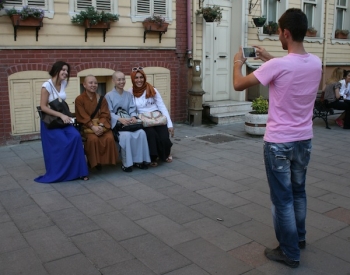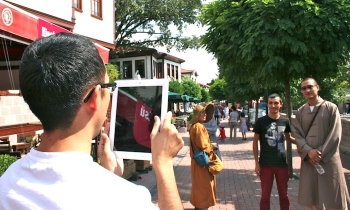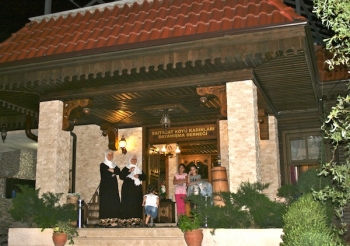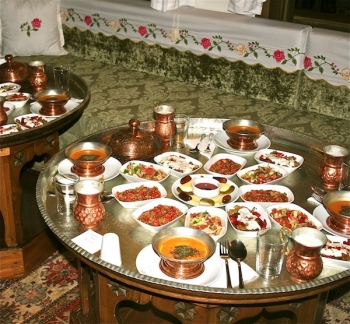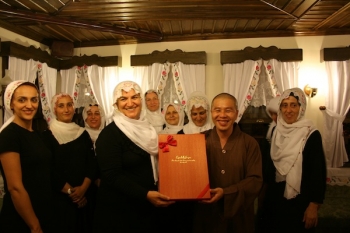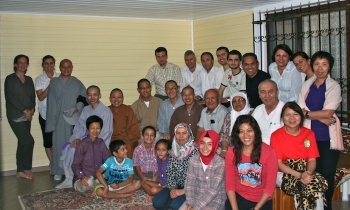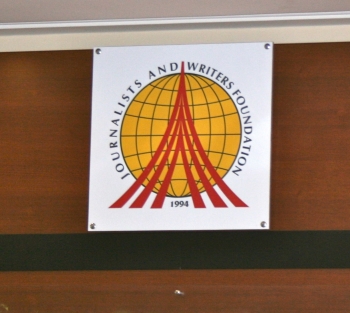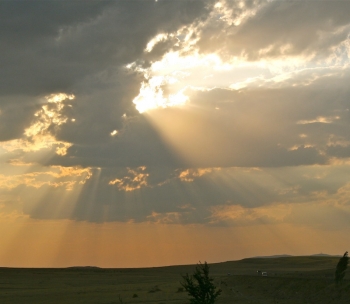Imagine … “a world where people are deeply grounded in a moral and ethical tradition, where humility and service are highly valued and where reason, science and technology are fully utilized for the benefit of all.”[1]
Does this sound like some sort of utopia that we would like to choose for the human race? A place where harmony reigns and suffering is diminished? From a Buddhist perspective, does it resonate with the ideal of following the middle path for the sake of all sentient beings?
These words, this dream, mirror the dedicated work of a Turkish Muslim scholar living in our modern times. His force of philosophy and concerns for peaceful coexistence among men has spawned a movement of believers around the world. His name is Fethullah Gülen.
But Buddhists, Christians, and Jews alike could voice these same words, too. This is why the connections begin, in ways to bridge the great divides that often separate us. Humanity is a shared concern, and while religions offer guidance in their doctrines, the common essences link us all in spirit. We are connected, whether we face it or not, in cooperation.
The Gülen Movement has promoted interfaith and intercultural dialogues for decades in many countries in order to encourage understanding, cultivate mutual respect and cooperation between disparate societies. Finding ways to live in peaceful coexistence are a mission. One such invitation for dialogue led a group of Buddhists to travel to Turkey this summer and discover the hosts’ intent.
The Anatolia Cultural & Dialogue Center in Hong Kong initiated and arranged the intercultural visit. The ACDC mission is to share their national ethos and friendly hospitality to promote bridging in human kinship and community. The Buddhists went to learn about a country with a rich cultural and religious history that has evolved into a contemporary secular society. Metaphorically, Turkey is balanced between East and West, and Muslim faith is the dominant religion today.
‘Warmth of hospitality’ abundantly springs to mind when travelling within Turkey as a visitor. Laughter, teasing, and friendly people greet you in all manner of casual encounters. They gleefully shouted “Japon” and “Kung Fu” in the direction of our Chinese appearance trying to make connection with labels that they knew. It was innocent and endearing. The monastic clothing of the monks and nuns in our group was a magnet for the curious. We became a ‘tourist attraction’ of sorts with Turkish locals requesting photo-ops.
It was the special month of Ramadan and the extra-holy atmosphere beheld the prayer and fasting rituals. No food, no drink in the daylight hours for the pious Muslims. We had something to learn in terms of patience on an empty stomach. While we wilted in the summer heat and cherished every meal, it was a marvel to observe our abstaining hosts in their positive repose. Although they were sometimes sleepy, their willingness to cope was an admirable display of faith.
One night in the mountains outside Bursa was a memorable dinner shared with five host couples that wanted to meet the Buddhist group. The restaurant was exceptional in that a village women’s association, the first of its kind in a male-dominated society, run it and the delicious food is locally grown. The ambience was as comfortable as a private home with children running about and attentive service from the traditional ladies. The unity of breaking fast together in the evenings created fellowship and sincere appreciation for our nourishment.
Gathered over coffee in a quiet room, we all joined “sharing” that night to exchange our views. After all, wasn’t that one of the reasons for our journey? Taking turns around the room, my heart beat fast to speak out loud and share the feelings hiding there. In contrast to my Asian friends, the story began with a cultural difference: “I am from New York”, were the words in introduction. Only days before, I had flown from there to join the group. Sitting in the warm circle gaze of those kind Muslim people, my tears began to fall.
Still too often now, the words New York and Islam occur together with 9/11. Like other pairs: of love and hate, extreme and not, and bias and intolerance. My tears sprang from a deep well of emotions – a place of misconceptions. I felt for the Americans who struggle to comprehend why these events took place. Terrorism spoils the amity and confounds the well-meaning people. Why is there so much hatred?
We met these sincere and gentle Turkish people who revere their Muslim faith. Their willingness to listen, and engage with other backgrounds, defies the negative perceptions. How I wish that life could be this way, with both sides reaching out in trust and conversation. The questions about religion and the mysteries of fear… make any of us vulnerable when facing strangers. There was compassion in that room and concern for making change.
That night taught me a lesson, to remember what is possible. The sincere efforts of our hosts reminded me of the goodness in human nature. When we laughed and dined together, the values of their community and humble service were clear. I reflected on this during the rest of our trip, and thought about my own connections with others. How do I reach out generously, and try to make a difference for harmony in the world?
In both small steps, and big strides, the Gülen movement spreads outwards with patience and, in many ways, common sense. Through faith, education, communication and humanitarian assistance – these grass-roots communities strive to make the world a better place. For me, to meet these people is an encouragement to make my own contribution. To imagine what can happen next and in the future for our children.
Buddhism is a journey of self-discovery and development of moral virtue. As individuals, we do not live in isolation. I have always felt that departing from one’s comfort zone is an excellent way to gain an understanding of different people, places, and things – and our connections to one another. With this in mind and working on awareness, how can we learn to help each other? We begin with ourselves, and make improvements to lead by positive example.
What I brought home from Turkey was inspiration. My heart has opened up. The dialogue arose, and the disparities explored. We learned about each other and probed the ways for peace. In so doing, the seeds of hope were planted and fertile ground was sown. We may be different in cultures and religion, but the sun shines on all of us as equals.
[1] Bruce Eldrige, “The Place of the Gülen Movement in the Intellectual History of Islam, Particularly in relation to Islam’s Confrontation with Post modernism”. Page 526, Gülen Conference, Dec. 4 – 6, 2009, Los Angelos, CA. http://gulenconference.net/
